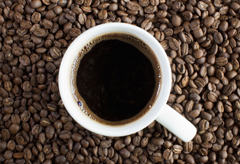Mothers-to-be should avoid high street coffee
Expectant mothers should avoid some cups of coffee sold on the high street due to higher caffeine levels

Expectant mothers should avoid some cups of coffee sold on the high street due to higher caffeine levels
A study has shown that cups of coffee sold on the high street may contain up to 50 percent more caffeine than a pregnant woman should consume in an entire day.
The caffeine levels in espressos and other coffees were found to be inconsistent, despite the widespread belief that all providers follow a set of guidelines.
‘At the low level, a pregnant woman might safely drink four cups per day without significantly exceeding the recommended intake,’ says Dr Crozier, a senior researcher at Glasgow University’s School of Medicine.
‘At the higher end of the scale, even one cup of espresso will be well in excess of the advised limit. There is clearly a problem. People at risk could unwittingly ingest far more caffeine than they would ever dream of.’
The study, which tested 20 coffee shops in the City, discovered that the strongest contained six times the amount of caffeine as the weakest.
Caffeine crosses the placenta to the unborn child and it can take up to 30 hours to break down in the body of a pregnant woman.
Celebrity news, beauty, fashion advice, and fascinating features, delivered straight to your inbox!
The Food Standards Agency has advised that mothers-to-be should limit themselves to 200mg of caffeine a day to avoid potential consequences regarding birth defects, miscarriage and premature delivery.
The leading destination for fashion, beauty, shopping and finger-on-the-pulse views on the latest issues. Marie Claire's travel content helps you delight in discovering new destinations around the globe, offering a unique – and sometimes unchartered – travel experience. From new hotel openings to the destinations tipped to take over our travel calendars, this iconic name has it covered.